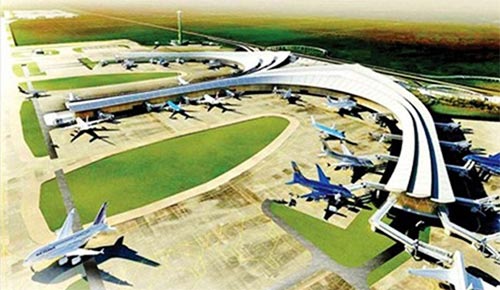NA deputies question southern airport finances

Long Thanh International Airport - illustration photo
“Most National Assembly members support the government’s plan for building a state-of-art international airport to meet the country’s aviation demand and contribute to spurring economic growth,” the National Assembly’s Economic Committee noted in a report released at the ongoing National Assembly session.
The project once completed would see Vietnam boast one of Asia’s biggest airports, seeing annual throughput of 100 million passengers.
The new airport would also ease congestion on Ho Chi Minh City’s Tan Son Nhat International Airport, with the first phase to become operational in 2025.
However, lawmakers’ concerns about the cost implications came as the government reported public debt had increased rapidly from 51.7 per cent of GDP in 2010 to 60.3 per cent at the end of 2014. This is expected to reach 64 per cent in 2015.
Vietnam’s public debt had increased because of the expansion of public investment, especially in infrastructure, healthcare and education, according to the government’s report released at the session.
The Ministry of Transport (MoT) estimated total investment for the three phases of the Long Thanh airport project would reach $18.7 billion, with first phase accounting for $7.8 billion.
The government reported this project would need around $1 billion from the state budget and at least $2 billion from official development assistance sources for the first phase.
The MoT two weeks ago announced Aéroports de Paris Management – a wholly-owned subsidiary of Aéroports de Paris Group – had expressed interest in investing about $2 billion into the planned airport.
“In the context of increasing public debt and limited state budget, it is unfeasible to finance the project with state capital,” the National Assembly’s Economic Committee noted.
Nguyen Van Giau, Chairman of the committee, said the government should further explain the construction timing and how the project would be funded.
He pointed out that the government had only put together a financing package proposal for the first phase, while funds for the second and third phases remained unclear.
What the stars mean:
★ Poor ★ ★ Promising ★★★ Good ★★★★ Very good ★★★★★ Exceptional
Latest News
More News
- Rising consumption and travel fuel ‘Tet season’ stocks (February 11, 2026 | 11:43)
- Education as strategic capital: why Dwight School Hanoi represents a long-term investment in Vietnam’s future (February 10, 2026 | 19:00)
- Green logistics–the vital link in the global energy transition (February 09, 2026 | 19:35)
- Wages and Lunar New Year bonuses on the rise (February 09, 2026 | 17:47)
- Temporary relief for food imports as businesses urge overhaul of regulations (February 07, 2026 | 09:00)
- Opella and Long Chau join forces to enhance digestive and bone health (February 06, 2026 | 18:00)
- Vietnam-South Africa strategic partnership boosts business links (February 06, 2026 | 13:28)
- Sun PhuQuoc Airways secures AJW Group support for fleet operations (February 06, 2026 | 13:23)
- Pegasus Tech Ventures steps up Vietnam focus (February 05, 2026 | 17:25)
- The generics industry: unlocking new growth drivers (February 04, 2026 | 17:39)













 Mobile Version
Mobile Version